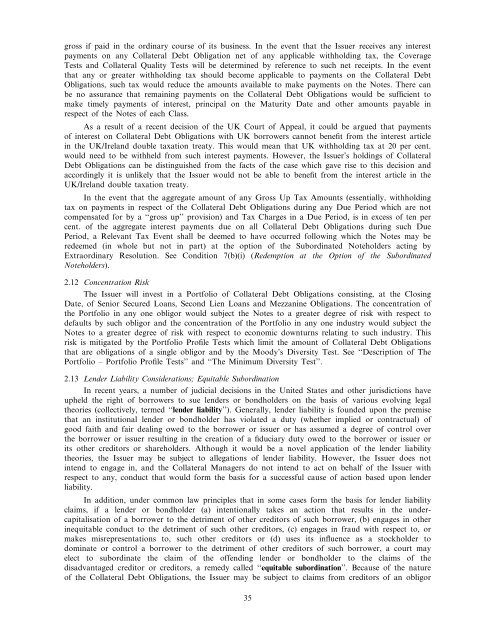VALLAURIS II CLO PLC - Irish Stock Exchange
VALLAURIS II CLO PLC - Irish Stock Exchange
VALLAURIS II CLO PLC - Irish Stock Exchange
Create successful ePaper yourself
Turn your PDF publications into a flip-book with our unique Google optimized e-Paper software.
gross if paid in the ordinary course of its business. In the event that the Issuer receives any interest<br />
payments on any Collateral Debt Obligation net of any applicable withholding tax, the Coverage<br />
Tests and Collateral Quality Tests will be determined by reference to such net receipts. In the event<br />
that any or greater withholding tax should become applicable to payments on the Collateral Debt<br />
Obligations, such tax would reduce the amounts available to make payments on the Notes. There can<br />
be no assurance that remaining payments on the Collateral Debt Obligations would be sufficient to<br />
make timely payments of interest, principal on the Maturity Date and other amounts payable in<br />
respect of the Notes of each Class.<br />
As a result of a recent decision of the UK Court of Appeal, it could be argued that payments<br />
of interest on Collateral Debt Obligations with UK borrowers cannot benefit from the interest article<br />
in the UK/Ireland double taxation treaty. This would mean that UK withholding tax at 20 per cent.<br />
would need to be withheld from such interest payments. However, the Issuer’s holdings of Collateral<br />
Debt Obligations can be distinguished from the facts of the case which gave rise to this decision and<br />
accordingly it is unlikely that the Issuer would not be able to benefit from the interest article in the<br />
UK/Ireland double taxation treaty.<br />
In the event that the aggregate amount of any Gross Up Tax Amounts (essentially, withholding<br />
tax on payments in respect of the Collateral Debt Obligations during any Due Period which are not<br />
compensated for by a ‘‘gross up’’ provision) and Tax Charges in a Due Period, is in excess of ten per<br />
cent. of the aggregate interest payments due on all Collateral Debt Obligations during such Due<br />
Period, a Relevant Tax Event shall be deemed to have occurred following which the Notes may be<br />
redeemed (in whole but not in part) at the option of the Subordinated Noteholders acting by<br />
Extraordinary Resolution. See Condition 7(b)(i) (Redemption at the Option of the Subordinated<br />
Noteholders).<br />
2.12 Concentration Risk<br />
The Issuer will invest in a Portfolio of Collateral Debt Obligations consisting, at the Closing<br />
Date, of Senior Secured Loans, Second Lien Loans and Mezzanine Obligations. The concentration of<br />
the Portfolio in any one obligor would subject the Notes to a greater degree of risk with respect to<br />
defaults by such obligor and the concentration of the Portfolio in any one industry would subject the<br />
Notes to a greater degree of risk with respect to economic downturns relating to such industry. This<br />
risk is mitigated by the Portfolio Profile Tests which limit the amount of Collateral Debt Obligations<br />
that are obligations of a single obligor and by the Moody’s Diversity Test. See ‘‘Description of The<br />
Portfolio – Portfolio Profile Tests’’ and ‘‘The Minimum Diversity Test’’.<br />
2.13 Lender Liability Considerations; Equitable Subordination<br />
In recent years, a number of judicial decisions in the United States and other jurisdictions have<br />
upheld the right of borrowers to sue lenders or bondholders on the basis of various evolving legal<br />
theories (collectively, termed ‘‘lender liability’’). Generally, lender liability is founded upon the premise<br />
that an institutional lender or bondholder has violated a duty (whether implied or contractual) of<br />
good faith and fair dealing owed to the borrower or issuer or has assumed a degree of control over<br />
the borrower or issuer resulting in the creation of a fiduciary duty owed to the borrower or issuer or<br />
its other creditors or shareholders. Although it would be a novel application of the lender liability<br />
theories, the Issuer may be subject to allegations of lender liability. However, the Issuer does not<br />
intend to engage in, and the Collateral Managers do not intend to act on behalf of the Issuer with<br />
respect to any, conduct that would form the basis for a successful cause of action based upon lender<br />
liability.<br />
In addition, under common law principles that in some cases form the basis for lender liability<br />
claims, if a lender or bondholder (a) intentionally takes an action that results in the undercapitalisation<br />
of a borrower to the detriment of other creditors of such borrower, (b) engages in other<br />
inequitable conduct to the detriment of such other creditors, (c) engages in fraud with respect to, or<br />
makes misrepresentations to, such other creditors or (d) uses its influence as a stockholder to<br />
dominate or control a borrower to the detriment of other creditors of such borrower, a court may<br />
elect to subordinate the claim of the offending lender or bondholder to the claims of the<br />
disadvantaged creditor or creditors, a remedy called ‘‘equitable subordination’’. Because of the nature<br />
of the Collateral Debt Obligations, the Issuer may be subject to claims from creditors of an obligor<br />
35

















